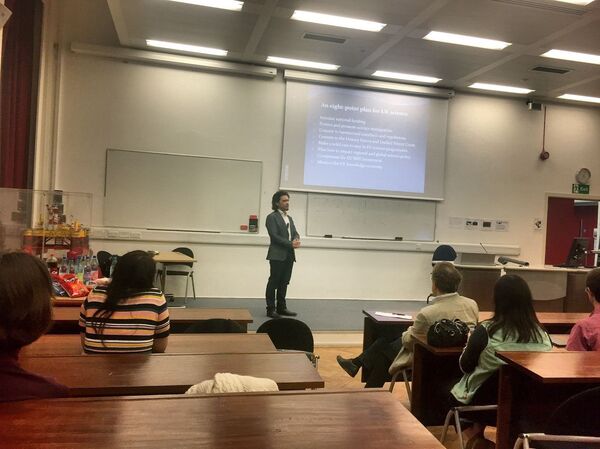Scientists for EU, is a campaign that formed in response to the possibility of a UK Brexit and the perceived impact it would have on UK's science industry. The initial motivations for providing a collective voice on behalf of a world-leading industry have since proven to be even more important and the next phase for the group is very much about damage limitation.
This is precisely right. It's "Quick let's force the Brexit before people realise what it means for fuel prices, food prices and the NHS." https://t.co/xvHtzyYNoq
— Scientists for EU (@Scientists4EU) October 12, 2016
At a lecture held in London this week, Dr. Mike Galsworthy, who helped initiate the Scientists for EU campaign, spoke about what the remit of the campaign has become, following the UK's vote to leave the EU.

"We are continuing our duty to put the UK's knowledge economy back on the front foot for the UK Government. In the overall hierarchy of national needs, science may be seen as a little lower down in terms of national priorities, but the industry will always require long-term investment to maintain its status as a world-leading superpower," Dr. Galsworthy said.
One week after the referendum result, the campaign group launched an open survey for research fraternities and other factions of the science industry so they could share any immediate impacts from the vote.
Please contribute & RT/share.
— Scientists for EU (@Scientists4EU) October 7, 2016
European Biotechnology Network survey: Impact & perceptions of Brexit on science:https://t.co/9X38AQ62Ji pic.twitter.com/5hh9xkG3u6
Early submissions have already indicated a number of concerns shared by others in the science field, ranging from restrictions on funding avenues, limiting opportunities and problems such as visa applications for students and researchers, as well as general travel complications as a result of the UK exiting the EU.
"The UK has almost overnight become less attractive as a place to do science," Dr. Galsworthy said.
He went to add: "a key reason is cultural, but equally if not more crucially is funding related with issues such as competition for EU funding likely to get more cut-throat and less in favor of the UK.
"A surge in xenophobia nationwide has also made many foreigners in the UK science base feel less welcome and very uncertain about their future rights."
But it's not all doom and gloom and the Scientists for EU campaign is now very much about proposing a step-by-step plan for the UK Government to consider as part of post-Brexit damage limitation.
"Since commencing our campaign we have been able to devise an 8-point action plan. This covers areas such as the need for increased funding and ensuring the UK is able to retain access to EU science programs. We are also addressing the dangers of over-regulation of our sectors and the scarcity factors likely to put us in more competition with our EU neighbors," Dr Galsworthy explained.
State of Worry
But Brexit has left many industries in a state of worry about their future and this is understandable, when resources are set to be scarce.
How the EU strengthens UK public health, health services and health research: https://t.co/KlgWAO24eP #HealthierIn pic.twitter.com/JPNFGxeSwS
— Healthier in the EU (@HealthierIn) February 19, 2016
The government is being forced to be quite selective about where future funding will go and advocates such as Dr. Galsworthy are simply taking action to ensure UK's world-leading science industry doesn't get overlooked.


